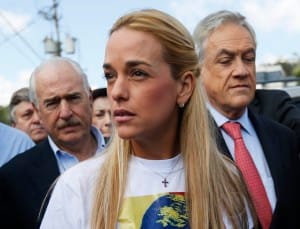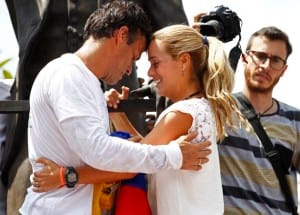
The Accidental Face of Venezuela’s Opposition
 President Nicolas Maduro’s strategy of jailing political opponents has empowered a former kite-surfing champion.
President Nicolas Maduro’s strategy of jailing political opponents has empowered a former kite-surfing champion.
In 2003, Lilian Tintori was perhaps best known as the kite-surfing champion of Venezuela. She did a stint on a survival-themed reality show, lent her face to public-service billboards warning against drunk driving, and hosted radio and television shows. She was a celebrity in her home country, famed for her looks and charisma.
But since the arrest of her husband, opposition leader Leopoldo Lopez, during widespread protests against the government of Nicolas Maduro last year, she has become an entirely different kind of celebrity: the accidental face of Venezuela’s beleaguered and often divided democracy movement. Lopez remains locked up in Ramo Verde military prison, on the outskirts of Caracas, and the government is seeking to keep him imprisoned for 10 years on charges including arson and conspiracy. In recent months, other leading opposition figures have been arrested and indicted, or lost support.
Enter Tintori. Four months after Lopez’s arrest, Tintori wrote an op-ed for The Washington Post disavowing any desire to become a politician. With more than a year of campaigning for her husband’s release behind her, she told me recently that she still doesn’t see herself that way. “Leopoldo is the politician,” she said via Skype. “I’m a human-rights activist, a Venezuelan, a mother, and a victim myself, and I’m very close to the victims of my country, to those who’ve had their husbands killed and their brothers imprisoned. I’m just one of the Venezuelans raising my voice and standing up for the rights of Venezuelans.”
Those rights have atrophied since Maduro came to power in 2013 via contested elections with only 50.6 percent of the vote compared with his challenger’s 49.1 percent. Maduro was the anointed successor of Hugo Chavez, who took office in 1999 and died in 2013, shortly after beginning his fourth term as president. Chávez may have initiated Venezuela’s protracted political crisis, but the current situation in the country is unprecedented. With a shockingly high violent-crime rate, an inflation rate of 68.5 percent (the highest in the world, according to Bloomberg), widespread food and medicine shortages, and ever-more-frequent water cutoffs and power outages, Maduro has seen his approval rating drop from 55 percent to 25 percent, according to a survey conducted in March. (Even eight out of 10 Chavistas—supporters of Chavez’s highly personalized socialist, anti-imperialist governance—are sick of him or his policies.) Maduro’s term is supposed to last until 2018, but given the country’s worsening political and economic crisis, events may change that.
And Maduro has good reason to fear Lopez. Lopez served two terms from 2000 to 2008 as mayor of the business-oriented Chacao municipality, where he earned a reputation among local voters and Venezuelans I’ve spoken with for transparent, effective governance. His youth, track record, movie-star good looks, and incendiary style of speaking—and even of tweeting, through which he has called Maduro a “coward” who didn’t “have the guts” to arrest him—stand in contrast to the plodding, overweight Maduro, who is nine years his senior and who often seems, unsuccessfully, to be aping Chavez’s oratory.
 Tintori told me that Lopez is “a prisoner because of his ideas, his words, for having denounced Maduro’s regime as anti-democratic, corrupt, and inefficient. Leopoldo’s is a political case because he’s a national leader representing hope and change for Venezuela, a future for Venezuela. Fearing all this, they keep him in prison.” As for herself, she maintains, “I’m like a carrier pigeon flying to and from Ramo Verde taking [Lopez’s] messages and bringing him messages.”
Tintori told me that Lopez is “a prisoner because of his ideas, his words, for having denounced Maduro’s regime as anti-democratic, corrupt, and inefficient. Leopoldo’s is a political case because he’s a national leader representing hope and change for Venezuela, a future for Venezuela. Fearing all this, they keep him in prison.” As for herself, she maintains, “I’m like a carrier pigeon flying to and from Ramo Verde taking [Lopez’s] messages and bringing him messages.”
What happens to Lopez matters both to Venezuelans desperate for change and to the United States. In March, the White House issued a statement denouncing “public corruption” in Venezuela and the Maduro government’s “efforts to escalate intimidation of its political opponents,” calling on Caracas to liberate Lopez and other political prisoners, and imposing sanctions against Venezuelan officials. Separately, President Obama and former President Bill Clinton have called for Lopez’s release; and Amnesty International has pronounced his plight “an affront to justice.” In total, there are as many as 98 political prisoners in Venezuela (the Maduro government denies that it holds political prisoners).
For the past 14 months, Tintori has devoted her life to winning her husband’s release, traveling abroad and meeting with a range of powerful figures, among them Vice President Joe Biden, Spanish Prime Minister Mariano Rajoy, and Pope Francis. She managed to secure a statement from Chile’s Senate calling on the Maduro government to release all political prisoners (including Lopez), permit free and fair elections, and respect human rights. It was quite an achievement in Latin America, where countries have often avoided taking open stands on the politics of their neighbors. Yet Maduro shows no signs of yielding. He has little reason to.
“We’re living through social, economic, and political crises,” Tintori told me, “and we’re on the verge of a humanitarian catastrophe. And the crime situation amounts to a violation of our right to life.”
She was not exaggerating. Armed robberies occur in broad daylight, kidnappings abound, and the country is second only to Honduras in its annual homicide rate—just shy of 25,000 in 2014. Soon after his election, Maduro announced that he was launching Plan Patria Segura (“Plan for a Safe Homeland”), which foresaw increased cooperation between the military, paramilitary forces, and the police. But nothing has changed.
“In Venezuela, either they kidnap you, kill you, or rob you. … Every 20 minutes a Venezuelan dies, a shot is fired, a Venezuelan cries out,” she said.
Besides crime, the country seems to be careening toward economic and social implosion. The fall in global oil prices has severely reduced hydrocarbon revenues—the source of 96 percent of the state’s exports and half its income. And almost all the country’s current troubles began with Maduro’s presidency. Just why is unclear, though state-imposed currency controls, a shortage of dollars (earned previously through the sale of oil abroad), and a thriving black market have all played a role. For Maduro, though, the problem is “economic warfare” and “sabotage” being waged by the Venezuelan elite.
As we talked, it became clear that Tintori was suppressing anguish over her husband’s plight. “We took the decision together that he would turn himself in, to unmask Maduro’s anti-democratic regime,” she told me. But the costs of that decision are mounting. On February 18, 2015 the anniversary of his detention, Lopez used his one weekly phone call from prison to give a lengthy interview to CNN en Español. As it was ending, the guards realized what was going on and yanked away the receiver. Prison authorities then suspended Tintori’s visits (during which she would bring along their two small children, Manuela and Leopoldo Santiago). She said that she has rarely been able to communicate with him in the two months since then, and that he’s spent half his term in solitary confinement—including 24 days in a tiny cell with no sunlight as punishment for his television interview. “They sound alarms at three in the morning so he can’t sleep,” she told me. “Men wearing ski masks and armed with shotguns search his cell, without his permission. They destroy his things and steal his writings. One night, they threw human excrement and urine through his cell’s barred window, and then cut off his light so he couldn’t bathe or clean his room.” Repeated requests for Venezuelan officials to comment on Tintori’s allegations of abuse have gone unanswered.
Tintori fears for her husband’s life; in March, a jailed opposition member, 63-year-old Rodolfo Gonzalez, hanged himself in his cell upon learning that he was to be transferred from Ramo Verde to a prison considered far more dangerous for detainees owing to the incarceration of hardened criminals there.
Meanwhile, Maduro seems to see Tintori herself as a threat. He has accused her of belonging to a “stateless oligarchy” under the control of the “far right” in the United States. (Maduro, as did Chavez before him, makes a habit of accusing the opposition of plotting coups, almost always under the sinister guidance of the reviled Yanquis of the Imperio to the north.) Her marriage to Lopez, her international campaign to win his release, her forceful denunciations of Maduro’s regime, and her celebrity all combine to imperil her. Maduro has twice called for her campaign to be “neutralized,” whether metaphorically or literally he did not say. In any case, Tintori told me that “this doesn’t sound good at all,” and said that Maduro has attacked her publicly as a traitor. After her visits to Washington to campaign for the release of political prisoners, he claimed that she was plotting “terrorist” actions and had pleaded before Congress for a U.S. military intervention in Venezuela. In view of all this, Tintori’s safety worries those on her team. She has a bodyguard while in Caracas, but not when she travels.
Daily life as an unintentional political figure is no easier. “The police follow me, take pictures of me, and persecute me,” she said. “They listen to my calls, they’re trying to scare us, to paralyze us.”(Venezuelan officials have not responded to these allegations either.) “But they aren’t going to paralyze us. They will not break Leopoldo, and they will not break our family.”
So she’s raising her children. “I have to be both mother and father, raising my kids at the same time as I work to get Leopoldo freed. … Leopoldo Santiago, who is two, learned to walk in Ramo Verde.” Her daughter Manuela, who is five years old, “often asks for her father,” Tintori said. “She’s very proud of him and doesn’t understand why he’s in prison.”
“What do you tell her?” I asked.
“The truth. I explain to her that Maduro is a politician and doesn’t want to compete with daddy, because it’s easier to put him in jail. … She asks me if Maduro is bad. I say I’m not the one to judge, but he’s doing bad things, and not just to us as a family but to the whole country.”
